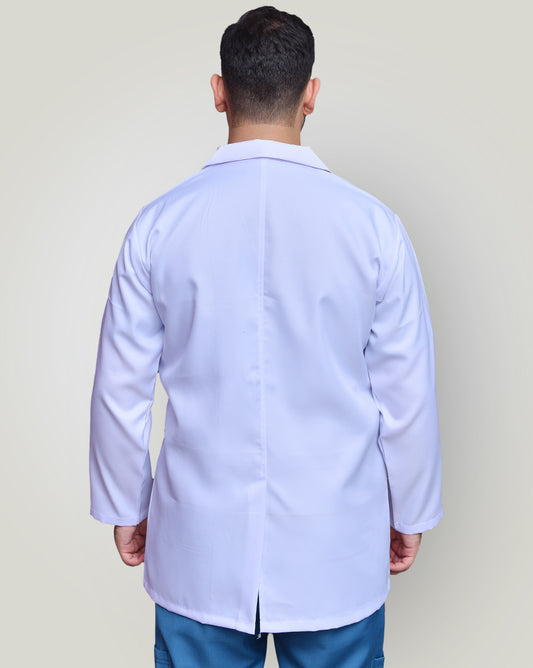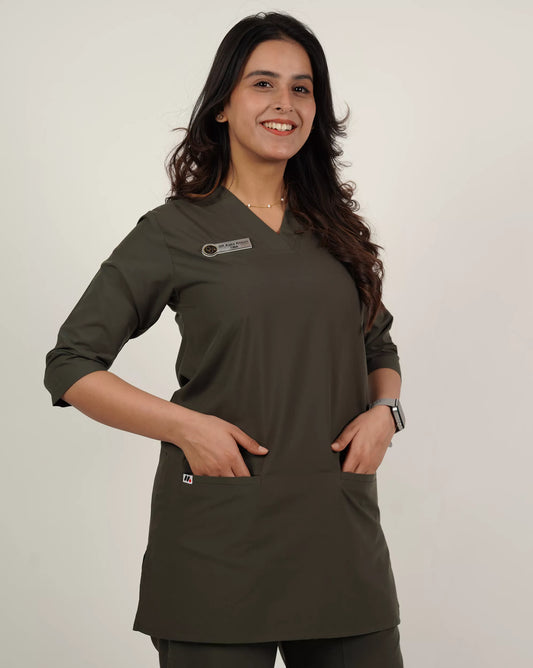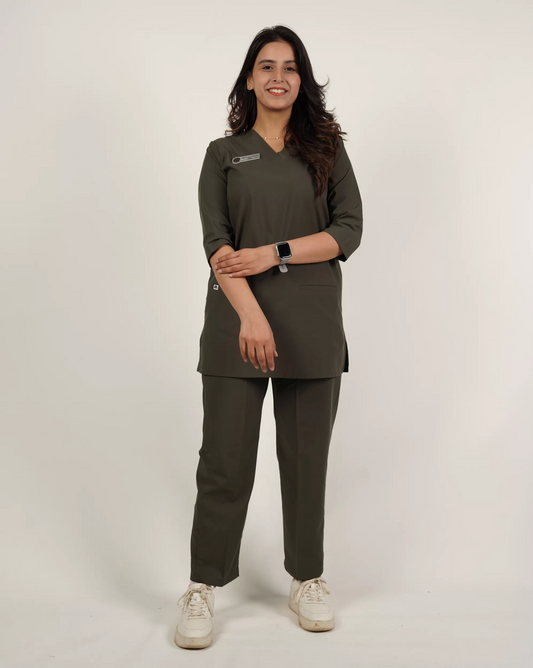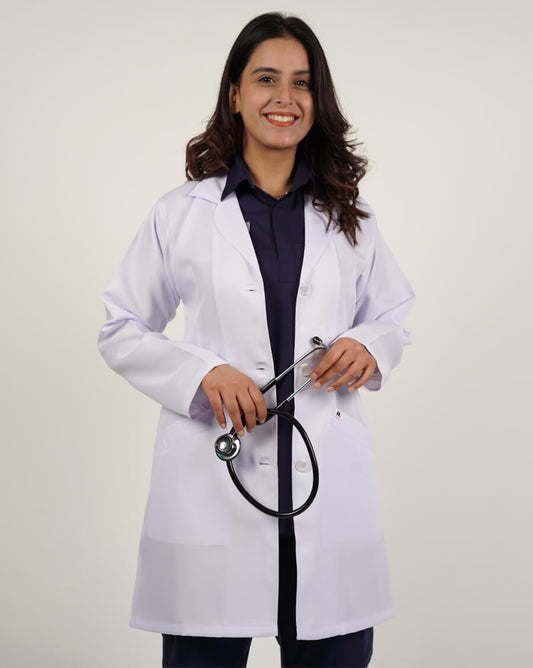Lab Coats: Types, Fit, Materials & Buying Tips for Pros
Did you know a lab coat is more than clothes? It shows trust, skill, and protection in healthcare. This guide helps healthcare workers in Pakistan upgrade their workwear. It talks about the importance of lab coats for medical professionals. They show a promise to health and safety. We’ll explore different lab coat styles and give tips on care, size, material, and where to buy.
Medfit gives great advice on buying the right lab coat. Whether you’re experienced or new, picking the right white coat matters. It can make your work better and you more comfortable and professional. Let’s learn together how to pick lab coats for success.
Understanding Different Types of Lab Coats

In the world of medicine and science, lab coat styles are diverse. They differ in both use and look. Finding the right medical lab coats means more comfort and better work in the health field. Lab coats vary by length, fit, and special designs for different jobs. Let’s see how these differences help doctors and scientists.
Short vs. Long Lab Coats
Choosing the right lab coat length depends on work needs. Short lab coats end near the hips. They allow you to move easily. This is good for safer areas. Long lab coats cover more and protect better against spills. They’re needed in risky places. The coat’s length affects both comfort and safety at work.
Specialized Lab Coats for Various Professions
Today, medical lab coats are made for specific jobs. For chemists, coats can resist harmful chemicals. Surgical coats have tight cuffs to keep things clean. It’s important to pick a lab coat that fits right and meets job safety needs.
Stylish Lab Coats for Modern Healthcare Apparel
Now, stylish lab coats are also important. Healthcare workers want to look good and feel good. These stylish lab coats mix fashion with function. They come in different shapes and colors. This way, medical professionals look sharp and stay safe at work.
How to Find the Perfect Fit: Sizing & Styles

Getting the right lab coat fit is key. It makes you look professional and feel comfortable. We will look at how to find a good fit. This includes trying both fitted and loose styles.
Determining Your Lab Coat Size
First, measure your body to find the perfect lab coat. You will need to measure your chest, waist, hips, and sleeve length. Use a flexible tape measure for this. Then, compare these to the manufacturer’s sizing guide.
Fitted vs. Loose Lab Coats
Some people like fitted lab coats, and some prefer loose ones. Fitted coats look sharp and show professionalism. They are great where looks matter a lot. Loose coats, however, let you move freely. This is good for tasks needing lots of hand movements.
Importance of Proper Fit for Professional Appearance
A lab coat that fits right makes you feel good and look good. It shows you’re careful and skilled. But a bad fit can make you look messy. This might make patients doubt your skills.
| Feature | Benefits of Fitted Lab Coats | Benefits of Loose Lab Coats |
| Appearance | Enhances professional image, looks tailored | Casual, relaxed appearance |
| Mobility | Designed to accommodate movement without excess fabric | Offers significant freedom of movement |
| Comfort | Follows the contours of the body, reducing bulk | Loose fit ensures comfort during long shifts |
Choosing the Right Material for Your Needs
The choice of lab coat material is very important. It needs to be comfy and useful for work. We look at different materials like cotton, polyester blends, and breathable ones. Each has special perks for work needs and what you like.
Cotton Lab Coats for Comfort
Cotton lab coats are mostly preferred by people because they are composed of natural fibers. The highly breathable quality of these coats makes them best for those who work long hours in the labs. Such cotton lab coats are extremely soft and pleasant, which makes them the best option for people with sensitive skin or allergies. Most importantly, keep your moisture free from sweat all day for comfort throughout.
Polyester Blends for Durability
They are ideal for active environments because they retain their outline and color after repetitive wash cycles. This makes them a smart choice for everyday wear.
Advanced Materials: Breathable & Moisture Wicking Options
Lab coats are now made with advanced materials that are a big step up. Coats that let air through are getting popular with doctors and nurses. These fabrics also pull sweat away from the skin. This is very important for staying comfy when it’s busy and warm. These new materials help professionals stay dry and comfy. This helps them do their best work and stay focused.
Essential Features to Look for in Lab Coats
When you pick a lab coat, look for features that help it last longer and work better. It’s not just the fabric that matters. The design and durability are key, too. Knowing what makes a good lab coat can help you choose the right one. This is very important for people who wear them every day.
Pockets: Storage Solutions on the Go
Pockets are very important. People need them to hold things like pens, notebooks, or medical tools. Having different sizes and placements of pockets makes a lab coat more useful. It helps people work better and more easily.
Lab Coat Closures: Buttons vs. Snaps vs. Zippers
Closure types affect how practical a lab coat is. Buttons look classic, but take time to close. Snaps close faster, and zippers make sure the coat stays put when you’re moving a lot. Each type has its own benefit depending on where you work.
Special Features: Stain Resistance & Easy Care
Having a lab coat that resists stains is very important. It keeps you looking clean and professional all day. It also makes the coat last longer because it’s easier to wash.
Choosing lab coats that are easy to take care of is smart. They need less ironing and handle a lot of washing. This makes life easier for healthcare workers.
Lab Coats Guide: Buying Tips from Medfit
Looking for the best lab coats? You should know a few important things. Medfit has created a guide to help you pick wisely.

Assessing Quality & Durability
It’s key to pick a lab coat that’s both high in quality and durable. Look for coats made of strong materials. These should stand up to lots of washes without losing shape. Blends like polyester and cotton are good.
Considering Price: Finding Value in Lab Coats
Price matters, but think about how long the coat will last, too. Paying more at first can mean a coat that lasts longer and protects better. Below is a table to help you see what you get for your money:
Where to Buy: Selecting the Right Suppliers
Choosing where to buy is very important. Look for sellers that are well-known and trusted in healthcare. Reading reviews and checking for certifications can help ensure you get a great lab coat.
Conclusion
We all know that a lab coat’s lifespan is affected by how well it is taken care of. We have provided the best tips for maintaining lab coats in all conditions and extending their durability. Lab coats need to be very white. This isn’t just about looking good. It’s about meeting high cleanliness standards in places where health is key. The tips we’ve given on cleaning, storing, and getting rid of stains will help. They make sure lab coats last longer and stay looking new.
To finish, picking your lab coat carefully, making sure it fits right and keeping it clean are key. These steps make sure you’re comfy and look professional every day. Good lab coat care is vital for a strong, positive image. And keeping them white shows you care deeply about your patients.
FAQs
What are the different types of lab coats available?
Lab coats have different styles. Some are short and some are long. Short coats let you move more and are safer for work. Long coats cover more and are better for risky tasks. Some coats are special for certain jobs. Like ones for lab scientists or healthcare workers. There are also stylish ones for a modern look.
How can I tell what size of lab coat fits me perfectly?
You can determine the size of your lab coat by measuring your hips, chest, and waist. Then, refer to the size chart from the maker. Always remember that different brands might fit differently. You also need to think about how long the coat is and the sleeve length. This helps make sure it fits well and covers right.
What is the difference between fitted and loose lab coats?
Fitted lab coats are close to your body. They look professional and neat. If you like a sharp look without extra fabric, they’re good. While loose coats give you more space to move. You can wear more clothes under them. They are comfy and good for many kinds of work.
Why choose a lab coat that fits properly?
A great fitted lab coat makes you feel comfy and free to move. It makes you look professional. Looking sharp shows you know your stuff, which ultimately makes people trust you more easily.
Are there any benefits of using cotton lab coats?
These lab coats are comfy and let your skin breathe. They are great for long days at work. They are also good for people with sensitive skin or in hot places.
Why might I choose a polyester blend lab coat?
Polyester lab coats last a long time and don’t wear out easily. They don’t wrinkle much and keep their shape after many washes. They are great for tough jobs and look good.
What advanced materials are available for lab coats, and what are their advantages?
Some lab coats have smart materials that keep you dry and comfy. They help control your temperature during busy work or in changing climates. They also fight germs, which helps keep things clean.
What features should I look for in a lab coat?
Look for coats with pockets for your tools and things. Choose coats with buttons, snaps, or zippers that you like. Some have special features, like stain resistance and easy cleaning.
How can I check the durability and quality of a lab coat?
To determine a lab coat’s quality, check the fabric and the techniques used in its construction. See if the stitching is strong. Read what other doctors say about it. Good coats are tough and well-made.
How do I balance price and value when choosing a lab coat?
Find a coat that has what you need and is made well, but not too pricey. Sometimes, paying more for quality is smart. A good coat is worth it for your job.
Where to buy the best lab coats?
The best place is one that has lots of lab coat options. They have comments from other buyers to help you decide. You can buy online, in medical stores, or straight from the maker.









